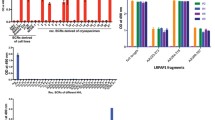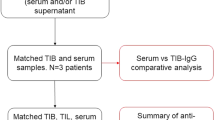Abstract
Purpose
Molecules which are exclusively or preferentially expressed by malignant cells are potential targets for immunotherapeutic approaches to the treatment of cancer.
Methods
We therefore tested serum samples of 95 patients with aggressive B-cell lymphomas for antibodies against lymphoma-associated molecules using SEREX for antibodies against BCL-2, BCL-XL, MCL-1, survivin, BCL-6, CD20, LM02, PDE4B, cyclin-D2, actinin-α1, SCYA3, PKCβ2, E2IG3, and HGAL.
Results
One patient had low-titered (1:100) antibodies against PKCβ2. Antibodies against BCL-2 were detected in the sera of five patients (5.3%), with responses found more frequently in follicular lymphoma grade 3 (3/26 or 11.5%) than in diffuse large B-cell lymphomas (2/67 or 3%). Anti-BCL-2 antibodies were of the IgG class and titers ranged from 1:1,000 to 1:100,000 with highest titers before treatment and decreasing slowly during remission.
Conclusion
The spontaneous immunogenicity of BCL-2 makes this molecule a prime candidate for vaccine approaches in BCL-2 positive B-cell lymphomas.

Similar content being viewed by others
References
Andersen MH, Pedersen LO, Capeller B, Brocker EB, Becker JC, Thor SP (2001) Spontaneous cytotoxic T-cell responses against survivin-derived MHC class I-restricted T-cell epitopes in situ as well as ex vivo in cancer patients. Cancer Res 61:5964–5968
Andersen MH, Kvistborg P, Becker JC, Thor SP (2005a) Identification of an HLA-A1 restricted CTL epitope from Mcl-1. Leukemia 19:1084–1085. doi:10.1038/sj.leu.2403743
Andersen MH, Reker S, Kvistborg P, Becker JC, Thor SP (2005b) Spontaneous immunity against Bcl-xL in cancer patients. J Immunol 175:2709–2714
Andersen MH, Svane IM, Kvistborg P, Nielsen OJ, Balslev E, Reker S, Becker JC, Straten PT (2005c) Immunogenicity of Bcl-2 in patients with cancer. Blood 105:728–734. doi:10.1182/blood-2004-07-2548
Bonetti A, Zaninelli M, Leone R, Cetto GL, Pelosi G, Biolo S, Menghi A, Manfrin E, Bonetti F, Piubello Q (1998) Bcl-2 but not p53 expression is associated with resistance to chemotherapy in advanced breast cancer. Clin Cancer Res 4:2331–2336
Buchholz TA, Davis DW, McConkey DJ, Symmans WF, Valero V, Jhingran A, Tucker SL, Pusztai L, Cristofanilli M, Esteva FJ, Hortobagyi GN, Sahin AA (2003) Chemotherapy-induced apoptosis and Bcl-2 levels correlate with breast cancer response to chemotherapy. Cancer J 9:33–41. doi:10.1097/00130404-200301000-00007
Campoli M, Chang CC, Ferrone S (2002) HLA class I antigen loss, tumor immune escape and immune selection. Vaccine 20(Suppl 4):A40–A45. doi:10.1016/S0264-410X(02)00386-9
Casati C, Dalerba P, Rivoltini L, Gallino G, Deho P, Rini F, Belli F, Mezzanzanica D, Costa A, Andreola S, Leo E, Parmiani G, Castelli C (2003) The apoptosis inhibitor protein survivin induces tumor-specific CD8+ and CD4+ T cells in colorectal cancer patients. Cancer Res 63:4507–4515
Chen YT, Scanlan MJ, Sahin U, Tureci O, Gure AO, Tsang S, Williamson B, Stockert E, Pfreundschuh M, Old LJ (1997) A testicular antigen aberrantly expressed in human cancers detected by autologous antibody screening. Proc Natl Acad Sci USA 94:1914–1918. doi:10.1073/pnas.94.5.1914
Chen YT, Gure AO, Tsang S, Stockert E, Jager E, Knuth A, Old LJ (1998) Identification of multiple cancer/testis antigens by allogeneic antibody screening of a melanoma cell line library. Proc Natl Acad Sci USA 95:6919–6923. doi:10.1073/pnas.95.12.6919
Eto M, Kodama S, Uemura N, Suzuki M (2007) Antibody responses to survivin and their clinical significance in patients with head and neck cancer. Head Neck 29:1128–1135. doi:10.1002/hed.20652
Grube M, Moritz S, Obermann EC, Rezvani K, Mackensen A, Andreesen R, Holler E (2007) CD8+ T cells reactive to survivin antigen in patients with multiple myeloma. Clin Cancer Res 13:1053–1060. doi:10.1158/1078-0432.CCR-06-1722
Huang S, Preuss KD, Xie X, Regitz E, Pfreundschuh M (2002) Analysis of the antibody repertoire of lymphoma patients. Cancer Immunol Immunother 51:655–662. doi:10.1007/s00262-002-0320-4
Kroemer G (1997) The proto-oncogene Bcl-2 and its role in regulating apoptosis. Nat Med 3:614–620. doi:10.1038/nm0697-614
Liggins AP, Brown PJ, Asker K, Pulford K, Banham AH (2004) A novel diffuse large B-cell lymphoma-associated cancer testis antigen encoding a PAS domain protein. Br J Cancer 91:141–149. doi:10.1038/sj.bjc.6601875
Lossos IS, Czerwinski DK, Alizadeh AA, Wechser MA, Tibshirani R, Botstein D, Levy R (2004) Prediction of survival in diffuse large-B-cell lymphoma based on the expression of six genes. N Engl J Med 350:1828–1837. doi:10.1056/NEJMoa032520
Manion MK, Hockenbery DM (2003) Targeting BCL-2-related proteins in cancer therapy. Cancer Biol Ther 2:S105–S114
Monti S, Savage KJ, Kutok JL, Feuerhake F, Kurtin P, Mihm M, Wu B, Pasqualucci L, Neuberg D, Aguiar RC, Dal Cin P, Ladd C, Pinkus GS, Salles G, Harris NL, Dalla-Favera R, Habermann TM, Aster JC, Golub TR, Shipp MA (2005) Molecular profiling of diffuse large B-cell lymphoma identifies robust subtypes including one characterized by host inflammatory response. Blood 105:1851–1861. doi:10.1182/blood-2004-07-2947
O’Brien S, Moore JO, Boyd TE, Larratt LM, Skotnicki A, Koziner B, Chanan-Khan AA, Seymour JF, Bociek RG, Pavletic S, Rai KR (2007) Randomized phase III trial of fludarabine plus cyclophosphamide with or without oblimersen sodium (Bcl-2 antisense) in patients with relapsed or refractory chronic lymphocytic leukemia. J Clin Oncol 25:1114–1120. doi:10.1200/JCO.2006.07.1191
Pfreundschuh M, Schubert J, Ziepert M, Schmits R, Mohren M, Lengfelder E, Reiser M, Nickenig C, Clemens M, Peter N, Bokemeyer C, Eimermacher H, Ho A, Hoffmann M, Mertelsmann R, Trumper L, Balleisen L, Liersch R, Metzner B, Hartmann F, Glass B, Poeschel V, Schmitz N, Ruebe C, Feller AC, Loeffler M (2008) Six versus eight cycles of bi-weekly CHOP-14 with or without rituximab in elderly patients with aggressive CD20+ B-cell lymphomas: a randomised controlled trial (RICOVER-60). Lancet Oncol 9:105–116. doi:10.1016/S1470-2045(08)70002-0
Preuss KD, Zwick C, Bormann C, Neumann F, Pfreundschuh M (2002) Analysis of the B-cell repertoire against antigens expressed by human neoplasms. Immunol Rev 188:43–50. doi:10.1034/j.1600-065X.2002.18805.x
Reed JC, Miyashita T, Takayama S, Wang HG, Sato T, Krajewski S, Aime-Sempe C, Bodrug S, Kitada S, Hanada M (1996) BCL-2 family proteins: regulators of cell death involved in the pathogenesis of cancer and resistance to therapy. J Cell Biochem 60:23–32. doi:10.1002/(SICI)1097-4644(19960101)60:1<23::AID-JCB5>3.0.CO;2-5
Reker S, Becker JC, Svane IM, Ralfkiaer E, Straten PT, Andersen MH (2004) HLA-B35-restricted immune responses against survivin in cancer patients. Int J Cancer 108:937–941. doi:10.1002/ijc.11634
Riker A, Cormier J, Panelli M, Kammula U, Wang E, Abati A, Fetsch P, Lee KH, Steinberg S, Rosenberg S, Marincola F (1999) Immune selection after antigen-specific immunotherapy of melanoma. Surgery 126:112–120
Rohayem J, Diestelkoetter P, Weigle B, Oehmichen A, Schmitz M, Mehlhorn J, Conrad K, Rieber EP (2000) Antibody response to the tumor-associated inhibitor of apoptosis protein survivin in cancer patients. Cancer Res 60:1815–1817
Rosenwald A, Wright G, Chan WC, Connors JM, Campo E, Fisher RI, Gascoyne RD, Muller-Hermelink HK, Smeland EB, Giltnane JM, Hurt EM, Zhao H, Averett L, Yang L, Wilson WH, Jaffe ES, Simon R, Klausner RD, Powell J, Duffey PL, Longo DL, Greiner TC, Weisenburger DD, Sanger WG, Dave BJ, Lynch JC, Vose J, Armitage JO, Montserrat E, Lopez-Guillermo A, Grogan TM, Miller TP, LeBlanc M, Ott G, Kvaloy S, Delabie J, Holte H, Krajci P, Stokke T, Staudt LM (2002) The use of molecular profiling to predict survival after chemotherapy for diffuse large-B-cell lymphoma. N Engl J Med 346:1937–1947. doi:10.1056/NEJMoa012914
Sahin U, Tureci O, Schmitt H, Cochlovius B, Johannes T, Schmits R, Stenner F, Luo G, Schobert I, Pfreundschuh M (1995) Human neoplasms elicit multiple specific immune responses in the autologous host. Proc Natl Acad Sci USA 92:11810–11813. doi:10.1073/pnas.92.25.11810
Sahin U, Tureci O, Pfreundschuh M (1997) Serological identification of human tumor antigens. Curr Opin Immunol 9:709–716. doi:10.1016/S0952-7915(97)80053-2
Scanlan MJ, Gure AO, Jungbluth AA, Old LJ, Chen YT (2002) Cancer/testis antigens: an expanding family of targets for cancer immunotherapy. Immunol Rev 188:22–32. doi:10.1034/j.1600-065X.2002.18803.x
Schmidt SM, Schag K, Muller MR, Weck MM, Appel S, Kanz L, Grunebach F, Brossart P (2003) Survivin is a shared tumor-associated antigen expressed in a broad variety of malignancies and recognized by specific cytotoxic T cells. Blood 102:571–576. doi:10.1182/blood-2002-08-2554
Schultz ES, Lethe B, Cambiaso CL, Van Snick J, Chaux P, Corthals J, Heirman C, Thielemans K, Boon T, van der BP (2000) A MAGE-A3 peptide presented by HLA-DP4 is recognized on tumor cells by CD4+ cytolytic T lymphocytes. Cancer Res 60:6272–6275
Shipp MA, Ross KN, Tamayo P, Weng AP, Kutok JL, Aguiar RC, Gaasenbeek M, Angelo M, Reich M, Pinkus GS, Ray TS, Koval MA, Last KW, Norton A, Lister TA, Mesirov J, Neuberg DS, Lander ES, Aster JC, Golub TR (2002) Diffuse large B-cell lymphoma outcome prediction by gene-expression profiling and supervised machine learning. Nat Med 8:68–74. doi:10.1038/nm0102-68
Soling A, Plugge EM, Schmitz M, Weigle B, Jacob R, Illert J, Holzhausen HJ, Rainov NG (2007) Autoantibodies to the inhibitor of apoptosis protein survivin in patients with brain tumors. Int J Oncol 30:123–128
Tureci O, Chen YT, Sahin U, Gure AO, Zwick C, Villena C, Tsang S, Seitz G, Old LJ, Pfreundschuh M (1998a) Expression of SSX genes in human tumors. Int J Cancer 77:19–23. doi:10.1002/(SICI)1097-0215(19980703)77:1<19::AID-IJC4>3.0.CO;2-2
Tureci O, Sahin U, Zwick C, Koslowski M, Seitz G, Pfreundschuh M (1998b) Identification of a meiosis-specific protein as a member of the class of cancer/testis antigens. Proc Natl Acad Sci USA 95:5211–5216. doi:10.1073/pnas.95.9.5211
Vence L, Palucka AK, Fay JW, Ito T, Liu YJ, Banchereau J, Ueno H (2007) Circulating tumor antigen-specific regulatory T cells in patients with metastatic melanoma. Proc Natl Acad Sci USA 104:20884–20889. doi:10.1073/pnas.0710557105
Acknowledgments
We thank Roche for supporting this work by an unrestricted grant and Maria Kemele and Evi Regitz for excellent technical assistance.
Conflict of interest statement
We declare that we have no conflict of interest.
Author information
Authors and Affiliations
Corresponding author
Rights and permissions
About this article
Cite this article
Zwick, C., Held, G., Hammermeister, V. et al. Spontaneous high-titered IgG antibody responses against BCL-2 in patients with aggressive lymphomas. J Cancer Res Clin Oncol 135, 1207–1213 (2009). https://doi.org/10.1007/s00432-009-0561-0
Received:
Accepted:
Published:
Issue Date:
DOI: https://doi.org/10.1007/s00432-009-0561-0




